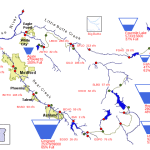CONTACT: Alan Journet, Co-facilitator, Southern Oregon Climate Action Now; alan@socan.eco 541-301-4107
SUBJECT: SOCAN Approves the Oregon Climate Protection Program.
Southern Oregon Climate Action Now (SOCAN) offers appreciation and kudos to the state’s Department of Environmental Quality and Environmental Quality Commission. Today EQC approved the Climate Protection Program rules proposed by the DEQ to meet the charge contained in Governor Browns 2020 Executive Order 20-04. That EO required state agencies to develop programs that reduce the state’s contribution to the global climate crisis.
Oregonians paying attention to climate trends and recent weather know that we are facing increasing problems. We are experiencing increasing temperatures, reduced snowpack, heat waves, drought, severe weather, increasing risk of wildfires and compromised natural ecosystems, agriculture, forestry, and fisheries. To address the climate crisis we confront, every city, state, and nation must contribute to addressing the root cause of the problem. This includes Oregon! What we need to do, very simply, is change our behavior to reduce our greenhouse gas emissions. We know how to do this, and we know it will not undermine our economy. All we need is to ignore the naysayers, and exhibit the will to do it. Our children and grandchildren demand no less of us.
In 2020, the Oregon legislature failed to pass a comprehensive greenhouse gas emissions reduction bill that would have placed our state on a path towards meaningful emissions reductions. Almost immediately, a well-informed and prepared Governor Kate Brown issued Executive Order 20-04 charging state agencies to develop programs that would establish a downward trajectory in state emissions, promote carbon sequestration in our natural and working lands, and do all this acknowledging that social justice issues must be addressed.
The most recent outcome of this state agency effort is approval on December 16th by the Environmental Quality Commission of a Climate Protection Plan developed by the state’s Department of Environmental Quality. The economic sector producing the largest slice of our statewide regulated emissions is transportation, it makes sense that this sector would be a prime target for emissions reductions.
The Climate Protection Program is exciting in that it puts the state’s fuel suppliers on an emissions reduction trajectory that will achieve a statewide reduction from the 2017-2019 average emissions of 90% by 2050, with a 2035 interim target of a 50% reduction. Stationary sources (industries) responsible for the largest industrial emissions are also required to install Best Available Emissions Reduction protocols and reduce emissions by 50% from that same 2017-2019 average in 2035. Meanwhile, fossil fuel suppliers unable to reduce their emissions are able to invest in Community Climate Investment credits. Funds from these investments will be used to promote social justice goals while reducing greenhouse gas emissions.
This program immediately places Oregon among the top five states in the nation in terms of addressing the existential climate crisis that is causing severe weather events across the country.
Southern Oregon Climate Action Now congratulates our state DEQ for developing such a program and the Environmental Quality Commission for endorsing it. The program thus becomes state law. We would have liked a program that targets net zero emissions by 2050, but recognize the constraints imposed on DEQ by community forces that seek to generate profits at the expense of the future of life as we know it. We are also concerned about the focus on promoting biofuels and so-called Renewable Natural Gas as solutions to the problem since any benefit they provide relies on the mistake of assessing only combustion emissions rather than including upstream (production and distribution) emissions. In response to concerns expressed about the Community Climate Investment options not including sequestration, DEQ agreed to consult with the Oregon Departments of Forestry and Agriculture and the Watershed Enhancement Board to consider ways sequestration can be incentivized.
The critical message is that we need to promote electrification of our lives and economy wherever possible and the generation of that electricity from genuine renewable energy sources. Overall, however, we offer kudos to DEQ and EQC for achieving a meaningful greenhouse gas emissions reduction program for Oregon.





